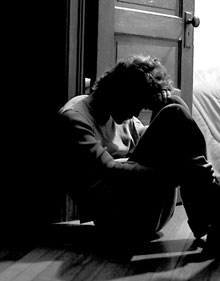
Think You has received many requests from its readers for articles which give practical insights on emotional well-being and coping with crises in daily life. We bring forth a new series of articles which will enable you to recognize emotional states which are limiting your happiness. These articles are neither medical nor psychiatric, but purely for the purpose of spreading awareness. We urge you to seek expert advice if you require help on these topics. Depression A very commonly observed disorder of the mood, depression may be described as a persisting feeling of unhappiness, frustration, irritability and a general low feeling. Here is some information for you to understand the state and know what to do about it.
A very commonly observed disorder of the mood, depression may be described as a persisting feeling of unhappiness, frustration, irritability and a general low feeling. Here is some information for you to understand the state and know what to do about it.
-
- Is sadness the same as depression`
While it is normal to feel sad over a personal loss, feeling depressed is altogether a different matter. Sadness lessens with time and the person feeling sad gradually comes to terms with it. Depression engulfs the person completely paralyzing his ability to live happily ` for months, and years if not treated properly.
-
- What causes depression`
Apart from environmental factors like the trauma of losing a loved one, there is also a physiological reason where the biochemical composition of the brain gets altered resulting in an altered emotional state, causing depression. An individual exposed to stress, violence, neglect and abuse for a prolonged period becomes more vulnerable to depression. However, depression can still affect people living a privileged life.
- How can I recognize the symptoms of depression` The symptoms for depression can be classified into four broad categories based on how it manifests itself:
- Mood related ` depressed mood accompanied by a feeling of worthlessness and guilt, finding no pleasure in otherwise pleasurable activities.
- Behavioral ` displaying agitation, frustration and social withdrawal.
- Thinking related ` difficulty in concentration and decision-making.
- Physical ` loss of sleep or excess of sleep, lack of energy, poor appetite or excess indulgence.
- Trouble functioning at home or work
- Experiencing abnormal fear, anxiety, or depression, terrifying memories, flashbacks
- Emotionally non-responsive and therefore disconnected from other
- Avoiding people or things connected to a particular traumatic event
- Excessive indulgence over food, drinks, shopping etc, which gives immediate pleasure
- Are children prone to depression too` People of all ages are susceptible to depression if they face the causal elements. Especially in the case of childhood trauma, which has long-lasting effect, any event that disrupts the child`s sense of safety and security can cause depression. The daily pressures of performance and competitiveness puts the adolescents at high risk too. Exam-related stress, hormonal imbalance, criticism from parents, lack of acceptance by friends, is some of the reasons which create further concern. Childhood trauma which may cause depression:
- Bullying
- Criticism or neglect by parents
- Physical and verbal abuse
- Serious illness
- Unhappiness, abusive relation among the parents
- A serious illness
- Separation from a parent
- How can it be prevented`Here are some simple ways to manage yourself before it becomes more serious:
- Change your surroundings
- Soak up the sunlight
- Lift your spirits with music
- Start a little garden
- Your Physical Health
- Avoid the use of alcohol and other intoxicating substances
- Stabilize your blood sugar
- Go for simple unprocessed foods
- Exercise
- Smile
- Your Relationships
- Spend time with people who boost you
- Go out
- Talk to friends and people whom you trust
- Get involved in group activities
- Your Way of Thinking
- Positive self talk
- Pay someone a compliment
- Read inspirational quotes
- Change your surroundings
- How can it be overcome`
- The suffering from depression is likely to worsen if left unattended. Depression can be treated by a combination of talk-therapy or counseling and medicines which restore the biochemical balance of the brain. Having friends around who are aware is surely a blessing. It is very important to understand that there is no stigma attached to the illness. It can happen to anyone, at any point of their lives. Timely help and care for the person will ensure a happy and fulfilling experience of life.
